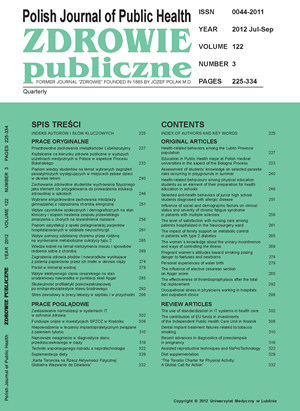Stres zawodowy w pracy lekarzy w szpitalu i w przychodni
Słowa kluczowe:
lekarze, stres, praca, szpital, przychodniaAbstrakt
Wstęp. Zawód lekarza może być źródłem satysfakcji, ale również znacznego stresu. Do głównych czynników stresujących należą odpowiedzialność za zdrowie i życie pacjentów, nadmierna biurokracja, długa nieobecność w domu, ciągła gotowość, jednoczesne wykonywanie wielu czynności, dylematy moralne i etyczne.
Cel. Celem niniejszej pracy było zbadanie związku pomiędzy specyfiką miejsca pracy lekarzy a ich podatnością na czynniki stresujące, zaburzeniami występującymi w sytuacjach stresowych oraz stosowanymi strategiami radzenia sobie ze stresem.
Materiał i metody. Badanie przeprowadzono w Tarnowie metodą ankietową wśród 116 lekarzy, z których 56 zatrudnionych było w szpitalach a 60 w przychodniach. W opracowaniu statystycznym zastosowano test niezależności χ2.
Dyskusja. Dla lekarzy pracujących w szpitalach bardziej stresujące niż dla ich kolegów z przychodni okazały się reformy służby zdrowia i ubezpieczeń, biurokracja, atmosfera w miejscu pracy, konflikty ze współpracownikami i ryzyko zdrowotne. Lekarze w przychodniach w sytuacjach stresowych częściej niż ci ze szpitali narzekali na trudności z koncentracją i biegunki a rzadziej na zgagę, w znacznie większym stopniu odreagowywali stres płaczem, a w mniejszym oglądaniem telewizji, piciem alkoholu czy częstym podróżowaniem.
Wnioski. Praca polskich lekarzy, niezależnie od miejsca jej wykonywania jest źródłem znacznego stresu, jednakże zatrudnienie w szpitalu jest znacznie bardziej stresujące niż w przychodni. Związane jest też z większą odpornością na stresy w życiu prywatnym. Objawy stresu i stosowane przez lekarzy techniki jego redukcji również w znacznym stopniu wynikały ze specyfiki miejsca pracy.
Bibliografia
1. Joyce CM, Schurer S, Scott A, et al. Australian doctors` satisfaction with their work: results from the MABEL longitudinal survey of doc¬tors. Med J Aust. 2011;3,194(1):30-3.
2. Wada K, Arimatsu M, Higashi T, et al. Physician job satisfaction and working conditions in Japan. J Occup Health. 2009;51(3):261-6.
3. Czabak-Garbacz R, Studenna M, Charytanowicz M, et al. Medical prob¬lems caused by work stress of polish nurse/midwives employed in emer¬gency wards. In: Z. Kotwica (ed). Medical and social problems of hu¬man in different periods of life. Politechnika Radomska; 2010. p.269-77.
4. Wang L, Wang C, Hsu S, et al. Active job, healthy job? Occupational stress and depression among hospital physicians in Taiwan. Ind Health. 2011;49(2):173-84.
5. Krebs E, Garrett JM, Konrad TR. The difficult doctor? Characteristics of physicians who report frustration with patients: an analysis of survey data. BMC Health Serv Res. 2006;6:128.
6. Tamioka K, Morita N, Saeki K, et al. Working hours, occupational stress and depression among physicians. Occup Med. 2011;61(3):163-70.
7. Peisah C, Latif E, Wilhelm K, et al. Secrets to psychological success: Why older doctors might have lower psychological distress and burnout than younger doctors. Aging & Mental Health. 2009;13(2):300-7.
8. Buddeberg-Fisher B, Stamm M, Buddeberg C, et al. Chronic stress experience in young physicians:Impact of person-and workplace-related factors. Int Arch Occup Environ Health. 2010;83(4):373-9.
9. Kisa S, Kisa A, Younis M. A discussion of job dissatisfaction and burnout among public hospital physicians. Int J Health Prom and Edu. 2009;47(4):104-11.
10. Balch CM, Shanafelt TD, Sloan J, et al. Burnout and career satisfaction among surgical oncologists compared with other surgical specialties. Ann Surg Oncol. 2011;18(1):16-25.
11. Charlton B. The cancer of bureaucracy: How it will destroy science, medicine, education and eventually everything else. Med Hypotheses. 2010;74:961-5.
12. Shaufelli WB, Bakker AB, Van der Heijden FMMA, et al.Workaholism, burnout and well-being among junior doctors: The mediating role of role conflict. Work Stress. 2009;23:155-72.
13. Gregov L, Kovacevic A, Sliskovic A. Stress among Croatian physicians: comparison between physicians working in emergency medical service and health centers:pilot study. Croat Med J. 2011;52(1):8-15.
14. Aminah A. Work-family conflict among junior physicians: It`s mediat¬ing role in the relationship between role overload and emotional exhaus¬tion. J Soc Scien. 2010;6(2):265-71.
15. Røvik JO, Tyssen R, Hem E, et al. Job stress in young physicians with an emphasis on the work-home interface: A nine-year, nationwide and longitudinal study of its course and predictors. Industrial Health. 2007;45:662-71.


